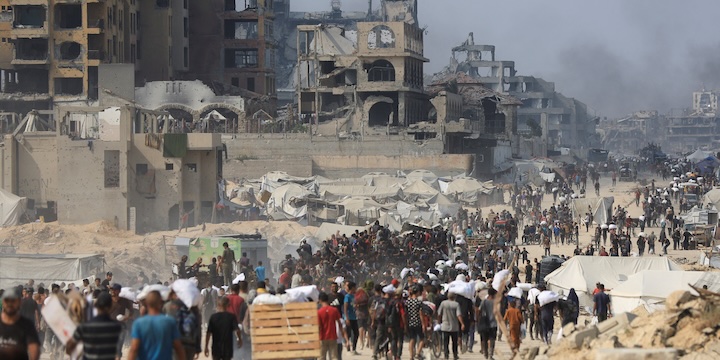FILE PHOTO: Palestinians carry aid supplies they collected from trucks that entered Gaza through Israel, in Beit Lahia, in the northern Gaza Strip August 10, 2025. Photo: REUTERS/Dawoud Abu Alkas/File Photo
While Israel has denied the tidal wave of lies that it’s causing a famine in Gaza, to what extent is Israel legally obligated to supply aid to Gaza, if the aid also helps Hamas?
Obviously, no one wants to see civilians suffer. But things are not so simple, because while Hamas has been mauled, it has yet to be eliminated, it’s still attacking the IDF and Israelis, it’s still holding hostages, and it’s still stealing and reselling food, often with the effective cooperation of certain “humanitarian” organizations, like the UN-affiliated World Food Programme..
So far, only the Gaza Humanitarian Foundation has been willing to make sure that its aid goes only to civilians. And a recent whistleblower complaint to USAID outlines how these other “humanitarian” groups have refused IDF offers to work together to ensure that aid was not stolen by Hamas, thereby acting to protect Hamas rather than Gaza civilians.
According to the whistleblower:
A firsthand eyewitnessing of senior Israel Defense Forces (IDF) officials offering any support necessary, including security protection and coordination, to representatives from the World Food Programme (WFP) and the U.N. Office for the Coordination of Humanitarian Affairs (OCHA) only to have WFP and OCHA respond that they were not prepared to discuss such coordination…
[The] IDF is actively helping the Gaza Humanitarian Foundation (GHF) get food into the hands of civilians while U.N. agencies, including WFP and OCHA, through their unwillingness to coordinate with the IDF, are inhibiting the distribution of such aid … [this refusal] raises serious questions.
Under international law, the refusal by these other “humanitarian organizations” to prevent Hamas from stealing aid makes all the difference in the world. That’s because Article 23 of the Fourth Geneva Convention, on Consignment of medical supplies, food and clothing, states that a party to the conflict is not obligated to allow aid convoys if it has “serious reasons for fearing”:
(a) that the consignments may be diverted from their destination,
(b) that the control may not be effective, or
(c) that a definite advantage may accrue to the military efforts or economy of the enemy through the substitution of the above-mentioned consignments for goods which would otherwise be provided or produced by the enemy or through the release of such material, services or facilities as would otherwise be required for the production of such goods.
The next paragraphs of Article 23 underscore that Israel has the right to block aid because its “permission is conditional” and it has the “right to prescribe the technical arrangements under which such passage is allowed.”
Prescribing the “technical arrangements” includes working with the Gaza Humanitarian Foundation, which is ensuring that the aid goes directly to civilians and that it is not stolen by Hamas. And it also includes not working with the WFP, OCHA, UNRWA, and other “humanitarian” organizations that seem to actually be agents of Hamas.
Not surprisingly, because it is actually aiding Gaza civilians rather than Hamas, the Gaza Humanitarian Foundation has been condemned by the “humanitarian” community, as reported by the BBC:
More than 170 charities and other NGOs are calling for the controversial aid distribution scheme in Gaza run by the Israel- and US-backed Gaza Humanitarian Foundation (GHF) to be shut down.
Also not surprising is that a UN press release, titled “UN experts call for immediate dismantling of Gaza Humanitarian Foundation,” has as its lead expert signer Francesca Albanese, the notorious antisemite who has been sanctioned by the United States.
The bottom line is that under international law, Israel has every right to refuse to work with these self-discrediting Hamas-adjacent “humanitarian” organizations, especially when the Gaza Humanitarian Foundation is there to pick up the slack.
Alex Safian, PhD, was until recently the Associate Director and Research Director of CAMERA, the Committee for Accuracy in Middle East Reporting in America.
Click this link for the original source of this article.
Author: Alex Safian
This content is courtesy of, and owned and copyrighted by, https://www.algemeiner.com and its author. This content is made available by use of the public RSS feed offered by the host site and is used for educational purposes only. If you are the author or represent the host site and would like this content removed now and in the future, please contact USSANews.com using the email address in the Contact page found in the website menu.





